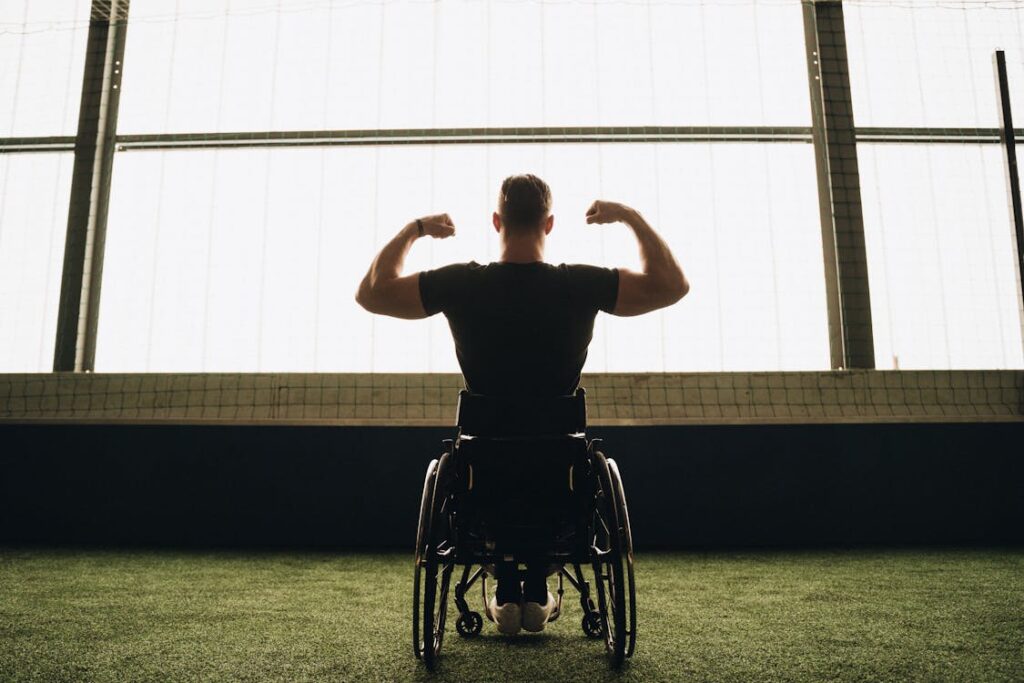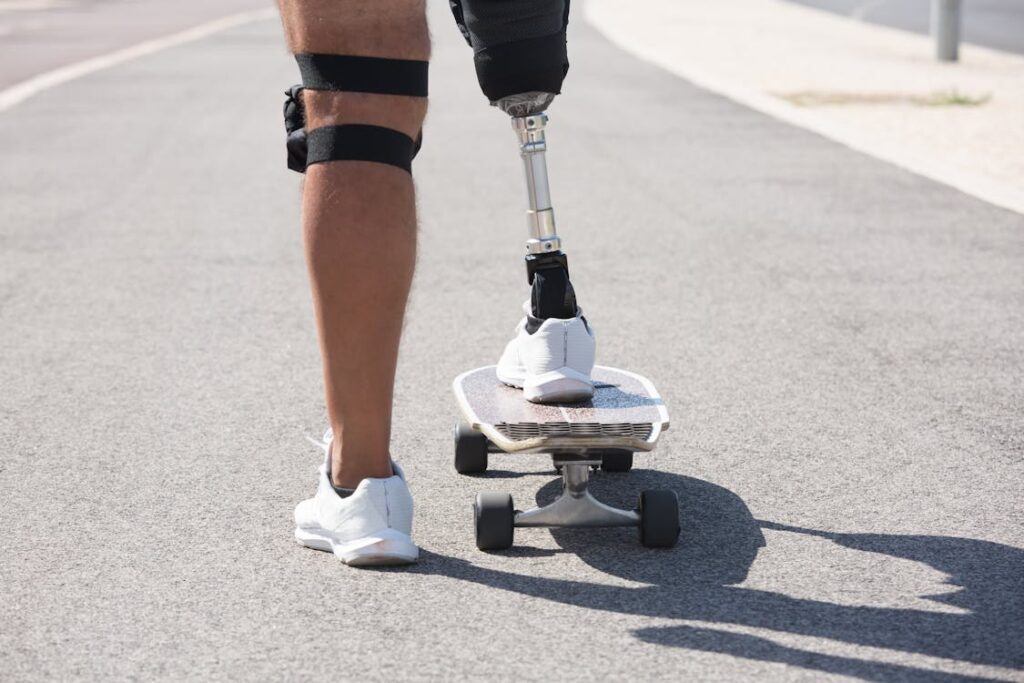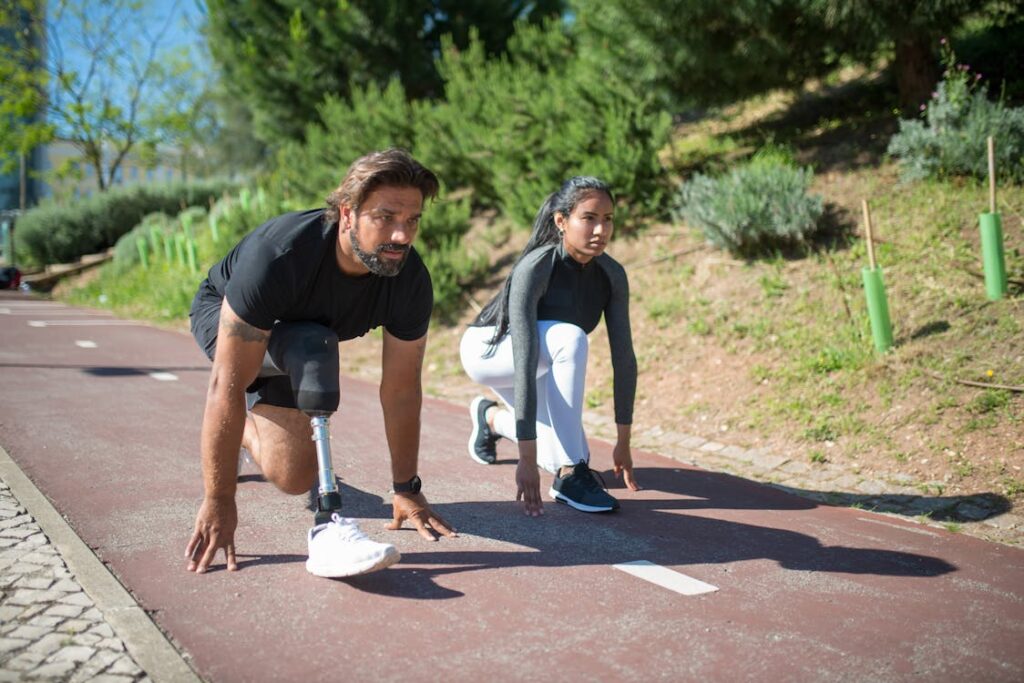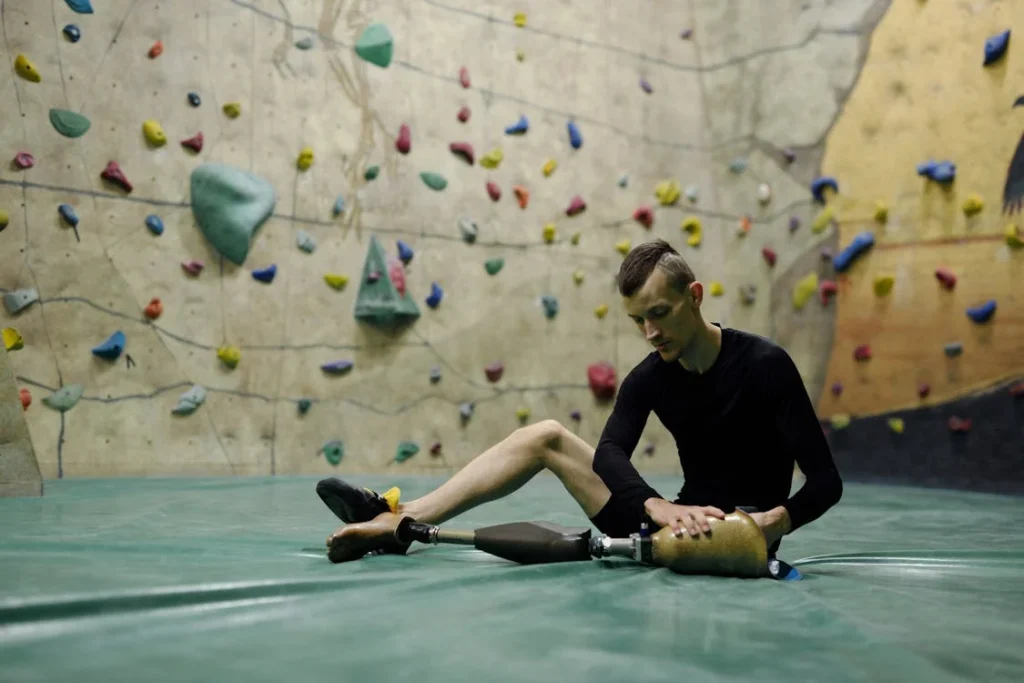Losing a limb changes many aspects of life, and your body’s health becomes more important than ever. Strong bones and muscles are key to maintaining balance, mobility, and overall well-being. But did you know that the right vitamins and minerals can make a big difference in how your body adapts to a prosthetic limb?
When you use a prosthesis, your muscles and bones work differently. Some areas take on extra weight and stress, while others may weaken over time. Proper nutrition helps your body stay strong, reduces discomfort, and improves energy levels. In this article, we’ll explore the essential nutrients that support amputees in staying active, reducing pain, and improving their quality of life.

The Role of Nutrition in Bone and Muscle Strength
For amputees, strong bones and muscles are not just about staying healthy—they are essential for balance, mobility, and comfort. When a limb is lost, the remaining muscles and bones work harder to support movement.
The body must adapt, shifting weight and pressure to different areas. Without the right nutrients, this can lead to muscle weakness, joint pain, and even bone loss.
A well-balanced diet filled with essential vitamins and minerals helps the body adjust more smoothly. It ensures that the muscles remain strong enough to support a prosthetic limb and that bones stay dense and resilient.
Proper nutrition can also reduce the risk of osteoporosis, a condition where bones become fragile and more prone to fractures. This is particularly important for amputees since their bodies often experience uneven stress distribution.
Why Bone Health Matters for Amputees
Bone health is a critical factor for anyone using a prosthetic limb. When a limb is lost, the remaining bones take on additional pressure, especially at the residual limb where the prosthetic connects.
Over time, this can lead to discomfort or even loss of bone density. Without strong bones, everyday activities like walking, standing, or even sitting for long periods can become painful.
Another major concern is the risk of osteoporosis. Since some muscles are no longer in use, the bones in that area may weaken due to reduced stimulation.
This makes it essential to consume the right nutrients that promote bone density. A lack of proper minerals can result in brittle bones, making them more likely to fracture even with minor falls or impacts.
How Muscle Strength Affects Mobility
Muscles play a vital role in helping amputees move with ease. When wearing a prosthetic, the muscles in the residual limb must work harder to provide stability and control.
Over time, the muscles can either strengthen with the right nutrition and exercise or weaken due to lack of proper support. If the muscles are not strong enough, it can lead to poor posture, discomfort, and increased strain on the joints.
Muscle weakness also increases the chances of fatigue. Many amputees experience exhaustion because their bodies need extra effort to perform basic movements.
The right nutrients help in muscle recovery and endurance, ensuring that daily activities do not feel overwhelming. A strong muscular system also improves overall balance, reducing the risk of falls and injuries.

Essential Vitamins for Strong Bones and Muscles
Vitamins play a crucial role in keeping bones and muscles strong, especially for amputees. Since the body undergoes additional strain when adapting to a prosthetic limb, the right vitamins help maintain strength, prevent injuries, and improve energy levels.
Some vitamins directly support bone density, while others enhance muscle function and recovery. Ensuring that these nutrients are part of a daily diet can significantly improve overall well-being.
Vitamin D: The Backbone of Bone Health
Vitamin D is one of the most important nutrients for maintaining strong bones. It helps the body absorb calcium, which is essential for bone density and strength.
Without enough vitamin D, bones can become weak, increasing the risk of fractures and pain. This is especially concerning for amputees since their remaining limbs bear extra weight and stress.
The body naturally produces vitamin D when exposed to sunlight, but many people do not get enough. Those who spend a lot of time indoors or live in areas with limited sunlight may be at risk of deficiency.
Fatigue, muscle weakness, and frequent bone pain can be signs that vitamin D levels are too low.
To increase vitamin D levels, spending at least 15 to 20 minutes in the sun daily can help. However, for those who cannot get enough sunlight, consuming foods like fortified dairy products, fatty fish, and egg yolks can provide a boost.
In some cases, vitamin D supplements may be necessary, but it is always best to consult a doctor before taking them.
Vitamin C: Boosting Collagen for Bone and Muscle Repair
Vitamin C is well known for supporting the immune system, but it also plays a major role in maintaining strong bones and muscles. It helps the body produce collagen, a protein that keeps bones flexible and muscles strong.
For amputees, collagen is essential because it helps the body repair and strengthen the tissues that support movement.
When vitamin C levels are low, wounds take longer to heal, and muscles may feel sore and weak. This can be a major issue for those using prosthetics, as the residual limb needs to remain strong and free from injuries.
Eating foods rich in vitamin C, such as oranges, bell peppers, and strawberries, helps improve collagen production. This ensures that bones stay durable and that muscles recover quickly after physical activity.
Vitamin B12: Supporting Energy and Nerve Health
Vitamin B12 is essential for keeping energy levels high and supporting nerve function. Since amputees often use more energy to move around, getting enough B12 helps prevent fatigue and weakness.
It also plays a role in producing red blood cells, which carry oxygen to the muscles. Without enough oxygen, muscles tire easily, making daily activities more challenging.
Another critical function of vitamin B12 is maintaining nerve health. Nerve signals play a big role in controlling muscle movement, balance, and coordination.
Deficiency in B12 can cause numbness, tingling, or weakness, which can affect mobility and comfort when using a prosthetic limb.
Foods like meat, fish, dairy, and eggs are rich sources of vitamin B12. For those who follow a plant-based diet, fortified foods or supplements may be needed to maintain healthy levels.

Key Minerals for Bone and Muscle Strength
Just like vitamins, minerals play an important role in keeping bones strong and muscles functioning properly.
Since amputees rely more on certain parts of their bodies to move and balance, ensuring that the body gets enough essential minerals is crucial for preventing weakness, pain, and long-term health issues.
Some minerals help strengthen bones, while others support muscle contractions and prevent cramps. A well-balanced diet that includes these minerals can improve mobility, reduce fatigue, and enhance overall strength.
Calcium: The Foundation of Strong Bones
Calcium is the most important mineral for bone health. It provides the structure and strength that bones need to handle stress, which is especially important for amputees who put extra weight on their remaining limbs.
Without enough calcium, bones can become weak and brittle, increasing the risk of fractures.
Many people associate calcium with dairy products like milk, cheese, and yogurt. While these are excellent sources, calcium is also found in leafy greens, almonds, and fortified plant-based milk.
The body absorbs calcium best when it has enough vitamin D, so ensuring both nutrients are part of a daily diet is important. If calcium intake is too low, supplements may be needed to maintain strong bones, but it is best to get nutrients from natural food sources whenever possible.
Magnesium: Supporting Muscle Function and Bone Density
Magnesium is often overlooked, but it is essential for both muscle and bone health. It helps muscles contract and relax properly, which is important for amputees who rely on their muscles for balance and movement.
Low magnesium levels can lead to muscle cramps, weakness, and stiffness, making it harder to move comfortably with a prosthetic limb.
In addition to muscle support, magnesium plays a key role in maintaining bone density. It works together with calcium and vitamin D to keep bones strong and prevent conditions like osteoporosis.
Without enough magnesium, bones can lose their strength over time, increasing the risk of fractures and joint pain.
Magnesium-rich foods include nuts, seeds, whole grains, and leafy greens. Those who experience frequent muscle cramps or fatigue may benefit from increasing their intake of these foods or discussing magnesium supplements with a healthcare provider.
Zinc: Healing and Strengthening Tissues
Zinc is another important mineral that helps amputees stay strong and healthy. It plays a major role in wound healing, which is important for those who wear prosthetics.
The residual limb can sometimes develop sores or irritation due to constant contact with the prosthetic socket. Having enough zinc in the diet helps the skin heal faster and prevents infections.
Zinc also helps in building and repairing muscles. Since amputees put extra strain on their muscles, getting enough zinc ensures that the body can recover properly after physical activity.
Foods like meat, shellfish, beans, and nuts are excellent sources of zinc. A diet lacking in zinc can slow down recovery, weaken the immune system, and increase the risk of infections.
Potassium: Preventing Muscle Fatigue and Cramps
Potassium is essential for proper muscle function. It helps regulate fluid balance in the body and prevents muscle cramps, which can be a common issue for amputees who rely heavily on certain muscle groups.
Potassium also supports nerve function, ensuring that signals between the brain and muscles are transmitted properly.
When potassium levels are low, muscles may feel weak or fatigued, making it harder to move around. Bananas, oranges, potatoes, and spinach are all rich in potassium and help keep muscles functioning smoothly.
Staying hydrated also helps maintain proper potassium levels, reducing the risk of muscle cramps and stiffness.

How Proper Nutrition Improves Prosthetic Comfort and Mobility
Getting the right balance of vitamins and minerals does more than just strengthen bones and muscles—it directly impacts how comfortable and effective a prosthetic limb feels.
Amputees often experience changes in their residual limb over time, including fluctuations in muscle mass, skin health, and even bone structure. A well-nourished body adapts better, allowing for greater mobility and reduced discomfort when using a prosthetic.
Reducing Pain and Discomfort
One of the biggest challenges amputees face is discomfort at the site where the prosthetic connects to the residual limb. This area undergoes continuous pressure, friction, and movement, which can lead to irritation or pain.
Proper nutrition plays a role in keeping the skin, muscles, and connective tissues healthy, reducing the likelihood of developing sores or infections.
Vitamins like C and E, along with minerals like zinc, help the skin heal faster and strengthen the tissues surrounding the bone.
Omega-3 fatty acids, found in foods like fish and walnuts, can also help reduce inflammation and pain, making it easier to wear a prosthetic for long periods without irritation.
When the body has all the nutrients it needs, minor wounds heal faster, and the risk of long-term skin problems decreases significantly.
Improving Energy and Endurance
Moving with a prosthetic limb requires more energy than typical movement. Many amputees experience fatigue, especially in the early stages of adjusting to a prosthetic.
This is because the body must work harder to maintain balance, shift weight, and use different muscle groups for stability. Proper nutrition helps provide the energy needed for these extra efforts.
Iron and vitamin B12 play a crucial role in transporting oxygen to the muscles, ensuring they do not tire too quickly. Low levels of these nutrients can lead to weakness, dizziness, and shortness of breath, making movement much more difficult.
Eating a diet rich in lean meats, leafy greens, and whole grains can help prevent these issues and improve endurance.
Magnesium and potassium also help in muscle recovery, reducing cramps and stiffness after prolonged use of a prosthetic. This is particularly important for amputees who are active or use their prosthetic for extended periods.
A well-balanced diet ensures that the body has everything it needs to recover efficiently, allowing for smoother and more comfortable movement.
Maintaining a Healthy Weight for Better Mobility
For amputees, maintaining a stable and healthy weight is especially important. Excess weight puts additional strain on the residual limb and the joints that bear most of the pressure when moving with a prosthetic.
Over time, this can lead to joint pain, fatigue, and difficulties in mobility.
At the same time, being underweight can also cause problems. A lack of muscle mass can make it harder to control a prosthetic limb, leading to instability and discomfort.
Proper nutrition ensures that the body has enough protein to maintain muscle strength while preventing unhealthy weight gain.
Balancing protein intake with healthy fats and complex carbohydrates can help amputees keep their weight within an ideal range. Foods rich in fiber, such as whole grains and vegetables, also support digestion and prevent energy crashes throughout the day.
Staying properly hydrated is equally important, as dehydration can lead to muscle cramps and fatigue, making it harder to move freely.
Supporting Long-Term Bone and Muscle Health
The effects of good nutrition go beyond just daily movement—they contribute to long-term health and mobility. As amputees age, they are at a higher risk of developing osteoporosis and muscle loss, both of which can make using a prosthetic more difficult.
Consistently getting enough calcium, vitamin D, and protein helps prevent these issues, ensuring that bones and muscles stay strong over the years.
Regular check-ups with a healthcare provider can also help monitor bone density and overall health, ensuring that nutritional needs are met. If necessary, supplements can be added to fill in any gaps in the diet, especially for nutrients like vitamin D, magnesium, and calcium.

Practical Ways to Improve Nutrition for Bone and Muscle Health
Understanding which vitamins and minerals are important is only the first step. The real challenge is making sure they become a regular part of an amputee’s daily diet.
Small changes in eating habits can make a big difference in overall strength, mobility, and comfort. By choosing the right foods, staying hydrated, and maintaining an active lifestyle, amputees can support their bone and muscle health in the long run.
Choosing Nutrient-Dense Foods for Daily Meals
A well-balanced diet should include a variety of nutrient-dense foods that provide essential vitamins and minerals.
Calcium-rich foods like dairy products, leafy greens, and almonds help strengthen bones, while protein from lean meats, fish, eggs, and legumes supports muscle repair and growth. Fatty fish such as salmon and tuna provide vitamin D, which is essential for calcium absorption.
For those who do not consume dairy, alternative sources of calcium like fortified plant-based milk, tofu, and seeds can help meet daily needs.
Similarly, plant-based protein sources such as lentils, chickpeas, and quinoa can be included in meals to support muscle strength. The key is to focus on whole, unprocessed foods rather than heavily processed options that may lack essential nutrients.
Staying Hydrated to Support Muscle Function
Water plays an important role in keeping muscles and joints healthy. Dehydration can cause muscle cramps, stiffness, and fatigue, making it harder to move comfortably with a prosthetic limb.
Drinking enough water throughout the day helps maintain proper muscle function and prevents unnecessary strain on the body.
Including electrolyte-rich drinks, especially after physical activity, can help replenish essential minerals like potassium and magnesium.
Coconut water, herbal teas, and homemade fruit-infused water are great options for staying hydrated while also getting additional nutrients. Avoiding excessive caffeine and sugary drinks can also prevent dehydration and energy crashes.
Incorporating Supplements When Necessary
While a healthy diet should always be the primary source of nutrients, some amputees may need supplements to fill in nutritional gaps.
Vitamin D supplements are often recommended for those who do not get enough sun exposure, while calcium and magnesium supplements may be helpful for maintaining bone density.
Before taking any supplements, it is important to consult a healthcare provider to ensure they are necessary and safe.
Too much of certain nutrients, such as calcium, can have negative effects on the body, so it is best to take supplements in the right amounts. Blood tests can help determine if there are any deficiencies that need to be addressed through supplementation.
Engaging in Regular Physical Activity
Exercise is just as important as diet when it comes to maintaining strong bones and muscles. Weight-bearing exercises such as walking, resistance training, and stretching help keep bones dense and muscles flexible.
For amputees, customized exercise routines can help strengthen the muscles that support the prosthetic limb, improving balance and reducing the risk of falls.
Low-impact activities like swimming, yoga, and cycling are excellent options for staying active without putting too much strain on the joints. Regular movement also helps improve circulation, which is essential for nutrient absorption and overall recovery.
Working with a physical therapist can provide personalized exercises that target specific muscle groups and improve mobility.
Monitoring Nutritional Health Over Time
Nutritional needs can change over time, especially as the body adapts to a prosthetic limb. Regular health check-ups, including bone density scans and blood tests, can help identify any deficiencies or imbalances.
Keeping track of energy levels, muscle strength, and any signs of pain or weakness can also indicate whether dietary changes are needed.
It is important to listen to the body and make adjustments as needed. If fatigue, muscle cramps, or bone pain become a common issue, it may be a sign that certain nutrients are lacking.
Working with a dietitian or nutritionist can provide additional guidance on meal planning and dietary adjustments.

The Impact of Amputation on Nutrient Absorption and Metabolism
Losing a limb not only changes mobility but also affects how the body processes and absorbs nutrients. Amputees often experience shifts in metabolism, muscle composition, and digestion, which can impact overall health.
Understanding these changes helps in making the right dietary choices to ensure the body continues to receive the nutrients it needs for long-term strength and energy.
How Amputation Affects Metabolism
The body’s metabolism—the rate at which it converts food into energy—can change significantly after an amputation. In some cases, the metabolic rate may decrease due to a reduction in overall muscle mass.
Since muscles burn more calories than fat, losing a limb may lead to a slower calorie-burning process, increasing the risk of weight gain if dietary intake is not adjusted accordingly.
However, for many amputees, the opposite can also be true. Using a prosthetic limb requires more energy, especially in the initial months of adaptation.
The body has to work harder to maintain balance, move efficiently, and compensate for the lost limb. This can lead to an increase in calorie needs.
If the diet does not provide enough energy, muscle loss, fatigue, and weakness can occur. Finding the right balance between calorie intake and expenditure is key to maintaining a healthy weight and preventing complications.
Digestive Changes and Nutrient Absorption
The digestive system plays a critical role in breaking down food and absorbing essential nutrients, but for some amputees, changes in physical activity levels and diet can affect digestion.
Reduced movement can slow down digestion, leading to issues like constipation or poor nutrient absorption.
Staying hydrated and consuming fiber-rich foods, such as fruits, vegetables, and whole grains, can help keep digestion smooth and ensure that nutrients are properly absorbed.
Certain medications that amputees may take for pain management, inflammation, or nerve sensitivity can also interfere with nutrient absorption.
For example, long-term use of some medications can reduce calcium absorption, increasing the risk of weaker bones. Others may affect levels of magnesium, potassium, or vitamin D, which are crucial for muscle and bone health.
It is important for amputees to monitor their nutritional intake and discuss potential deficiencies with a healthcare provider if they are on long-term medication.
Inflammation and Its Effect on Nutrient Needs
Inflammation is another factor that can affect how well the body absorbs and uses nutrients. After an amputation, the body undergoes a healing process, and in some cases, chronic inflammation can persist, leading to discomfort, swelling, and slow recovery.
Inflammation can also interfere with the absorption of key nutrients, such as iron and vitamin D, which are essential for bone strength and energy levels.
Eating an anti-inflammatory diet can help manage this issue. Foods rich in omega-3 fatty acids, such as salmon, flaxseeds, and walnuts, have natural anti-inflammatory properties.
Turmeric, ginger, and green leafy vegetables also help reduce inflammation and improve overall nutrient absorption.
By reducing inflammatory foods—such as processed sugars, fried foods, and excessive red meat—amputees can help their bodies recover more efficiently and maintain better nutrient balance.
The Connection Between Gut Health and Bone Strength
The gut plays a crucial role in overall health, including the ability to absorb calcium and other minerals necessary for bone density. A well-functioning gut microbiome, which consists of healthy bacteria, helps break down food and improve nutrient absorption.
Poor gut health can lead to deficiencies in essential vitamins and minerals, which in turn affects bone and muscle strength.
Probiotic-rich foods, such as yogurt, kefir, and fermented vegetables, help support gut health and ensure better absorption of nutrients like calcium and magnesium.
Prebiotic foods, such as garlic, onions, and bananas, also promote a healthy gut environment by feeding beneficial bacteria. By improving gut health, amputees can optimize their nutrient intake and support their overall bone and muscle function.
Conclusion
For amputees, strong bones and muscles are the foundation of mobility, comfort, and long-term well-being. The right balance of vitamins and minerals supports bone density, muscle strength, and overall energy levels, making it easier to adapt to a prosthetic limb and stay active. Essential nutrients like calcium, vitamin D, magnesium, and protein not only improve mobility but also prevent pain, fatigue, and complications such as osteoporosis.
Beyond diet, factors like metabolism, digestion, and inflammation can affect how well the body absorbs these nutrients. Staying hydrated, eating whole foods, and maintaining gut health play a key role in optimizing nutrient intake. Regular check-ups and adjustments to dietary habits ensure that the body continues to get the support it needs.
By making small but meaningful changes to nutrition, amputees can enhance their strength, improve prosthetic comfort, and maintain an active lifestyle. Investing in proper nutrition today leads to better mobility, reduced pain, and a higher quality of life in the future.



